June 8, 2020
Margarita Kalinina-Pohl and Rhianna Tyson Kreger
The discussion of gender issues in the nuclear field has gathered a great momentum in general and last month, in particular. Over a 10-day span, CNS and several other prominent nongovernmental, international, and professional organizations launched a series of discussions and reports focusing on the role of women and gender disparities in the nuclear field.
Some of these discussions and reports included several CNS staff and/or alumni of the Middlebury Institute of International Studies at Monterey (MIIS).
Featured CNS Webinar
Women in the Nuclear Field: Perspectives from Nigeria, Russia, Turkey, and Ukraine
The webinar included five professionals from four countries who are participating in the CNS Visiting Fellows Program. These include: Dr. Rabia Salihu Sa’id, Dr. Anastasia Barannikova, Ms. Fadime Ozge Ozkan, Ms. Hanna Martynenko, and Ms. Anastasiia Nechytailo.
The objective of this event was to introduce these women—each at a different stage of her nuclear- or STEM-related career—to the larger international community, to present their voices and stories. Other speakers included Sarah Bidgood and Nomsa Ndongwe, who provided special guest commentary at the opening and closing of the event. Margarita Kalinina-Pohl moderated the discussion, with Jean Du Preez serving as the webinar host.
With more than 60 people in attendance, this webinar was, in the words of the CNS expert Masako Toki, “one of the best, most inspiring, and heartwarming discussions.” Webinar panelists indeed offered a powerful and compelling discussion of highly important issues women in the nuclear field face today. Through their personal narratives—based on a set of questions distributed by the webinar moderator in advance—the speakers shared their perspectives and addressed a wide range of important matters as they pertain to women in science and the nuclear field today.
Young Women in Nonproliferation Initiative
Ms. Sarah Bidgood
 Director, CNS Eurasian Nonproliferation Program
Director, CNS Eurasian Nonproliferation Program
Sarah kicked off the discussion by highlighting the Young Women in Nonproliferation Initiative, which she leads, in addition to directing a large research program at CNS. Women, said Bidgood, still represent a minority of professionals working in the nonproliferation and disarmament field—an average of 20-30 percent of the total. For more information about Sarah’s take on gender and women, listen to the podcast: Promoting Peace: Viewing Peace Through a Gender Lens.
Stories from the Field
Dr. Rabia Sa’id
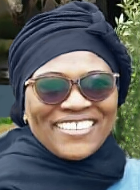 Physicist and Professor, Bayero University in Kano, Nigeria
Physicist and Professor, Bayero University in Kano, Nigeria
Dr. Sa’id discussed her path toward becoming a physicist. Despite her father’s wish for her to become a doctor, he was nevertheless a lifelong supporter of his daughter’s passion for education. Early in her career, Dr. Sa’id was one of only two women in the physics department at her university. She believes in the importance of promoting science among girls and young women and being a mentor to them. When asked what motivated her to become a mentor, Dr. Sa’id answered: “I mentor girls not because I am a great physicist, but to show them that physics is not as intimidating as it looks.”
Dr. Anastasia Barannikova
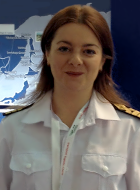 Researcher, Admiral Nevelskoy Maritime State University in Vladivostok, Russia
Researcher, Admiral Nevelskoy Maritime State University in Vladivostok, Russia
Dr. Barannikova shared the opportunities and challenges she has encountered during her career as a female regional scholar focusing on nuclear issues in East Asia. Dr. Barannikova noted that she did not experience discrimination at her workplace, and that it was her male supervisor who encouraged her to focus more on research and pursue her PhD. Her main challenge comes from the regional discrimination she experiences as a scholar, a problem not limited to Russia: her colleagues from East Asia experience the same impediments.
Ms. Ozge Ozkan
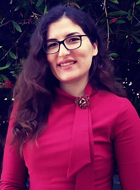 Nuclear engineer by training and a PhD candidate
Nuclear engineer by training and a PhD candidate
Istanbul Technical University, Turkey
As a young woman at the start of her career, Ozkan is optimistic that her generation can positively change cultural stereotypes about the roles of women in Turkish society. She also believes that Turkey’s pursuit of nuclear energy will attract a lot of young people, including women, to the field. However, she still sensed some skepticism from her family, despite their support, and others about her landing a career in the field of nuclear engineering.
Ms. Hanna Martynenko
 Assistant Professor
Assistant Professor
Department of Physics and Mathematics, Kyiv Polytechnic University
Martynenko noted that it was her female physics teacher from high school who inspired her to pursue her studies and career in STEM. Hanna noted that women are still greatly underrepresented in Ukraine’s nuclear sphere, and biases and gender discrimination remain stubbornly in place. Women, for example, are not allowed to become operators at nuclear power plants (NPPs), even if they have the same qualifications as their male counterparts. Although not every woman wants to become an NPP operator, Ms. Martynenko maintained, it should nonetheless be her right to choose to become one.
Ms. Anastasiia Nechytailo
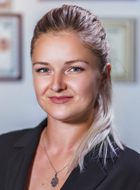 Head of International Cooperation Department SE “COTIS”
Head of International Cooperation Department SE “COTIS”
State Agency of Ukraine on Exclusion Zone Management (Chernobyl)
Nechytailo relayed a compelling story of overcoming hardships to pursue her dream career, and to continue her PhD studies in the field of national security. As a young woman with a non-technical background working in a technical—and predominately male—field, she has regularly dealt with biases and discrimination, but does not let these stop her. She continues advancing her career and deepening her knowledge of the technical field.
Key Takeaways on Gender Perspectives
Ms. Nomsa Ndongwe
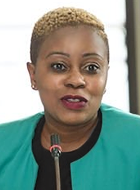 Former Zimbabwean Diplomat, MANPTS (MIIS)
Former Zimbabwean Diplomat, MANPTS (MIIS)
In her special guest commentary, MIIS student and former Zimbabwean diplomat Ms. Nomsa Ndongwe shared key takeaways from a recent report on Africa’s gender perspectives in arms control and disarmament by the United Nations Institute for Disarmament Research. She highlighted one recommendation that called for sustained efforts in attracting women to traditional and emerging STEM fields, such as cybersecurity, artificial intelligence, and biosecurity. Nomsa commended her fellow speakers for sharing stories that were both uplifting and exemplary of a welcomed holistic approach to WMD nonproliferation and disarmament: bringing together women with diverse backgrounds and perspectives who share the same goal of promoting peace and security in the world.
From the Webinar Organizers
This CNS webinar and other series of events emphasized once again the invaluable importance of advancing the field of WMD nonproliferation, disarmament, arms control, and CBRN security to more female scientists and practitioners. “By organizing our webinar, we hoped to amplify prominent voices and also introduce new voices through stories of five women who trained with CNS, and who can help build nonproliferation capacities in their home countries and institutions, including promoting the nuclear field among women and girls,” said Kalinina-Pohl.
Other Recently Released Resources on Gender and Women
- Promoting Peace: Viewing Peace Through a Gender Lens
PODCAST: Sarah Bidgood, CNS Eurasia Program Director (and MIIS alumna)
- Gender Champions in Nuclear Policy Impact Report
VIRTUAL EVENT: The Nuclear Threat Initiative, jointly with the Ploughshares Fund
- Gender Perspectives in Arms Control and Disarmament: A View from Africa
REPORT: The United Nations Institute for Disarmament Research
Based on their workshop in Entebbe, Uganda, which included the participation of MIIS student Nomsa Ndongwe.
- Gender and Nuclear Security: Challenges and Opportunities for Great Participation of Women in Nuclear Security
WEBINAR: Hosted by the World Institute of Nuclear Security, featuring MIIS alumnus Hubert Foy (MAIPS’10) as one of the panelists.
